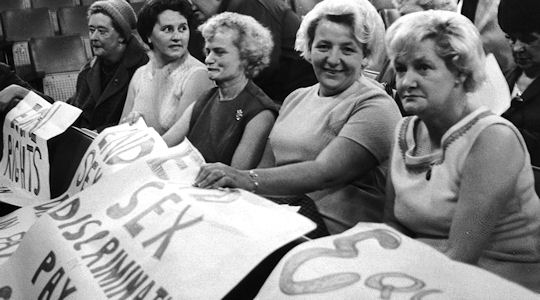Made in Dagenham: a victory for women’s rights
Four women, whose quest for equal pay in 1968 bought a Dagenham factory to a standstill meet the home secretary, as a film documenting their story is tipped to become autumn’s hottest Brit flick.
There are times when cultural snobbery is wildly inappropriate. And there are times when it’s an obstacle to good old-fashioned fun. Watching Made in Dagenham is one of those times.
Because this is a great film with so much heart. And its cast is uniformly brilliant. Sally Hawkins, as head striker Rita O’Grady, is nothing short of stunning. She turns in a performance which is even better than her Golden Globe winning turn in Mike Leigh’s Happy Go Lucky, this time with much more layers of subtlety and sensitivity.
Hawkins is backed up by a talented supporting cast including Jaime Winston, Bob Hoskins, Geraldine James, Miranda Richardson and Andrea Riseborough.
Made in Dagenham tells the incredible story of the 187 women who went on strike at Ford’s Dagenham factory in 1968 in protest at being downgraded to ‘unskilled’ workers.
But the stand-out performance for me comes from Rosamund Pike, who almost steals the whole film, particularly in her final scene with Sally Hawkins.
From her breakthrough role as a Bond girl in Die Another Day to memorable performances in Joe Wright’s Pride and Prejudice and last year’s An Education, as well as stand-out theatre roles in Gaslight and Summer and Smoke, Pike has spent the last 10 years quietly becoming one of our most talented and versatile actors.
Equal rights
But in this film, it’s the story that’s the real star. Made in Dagenham tells the incredible story of the 187 women who went on strike at Ford’s Dagenham factory in 1968 in protest at being downgraded to ‘unskilled’ workers.
The strike brought the factory – employing a total workforce of 55,000 and churning out half a million cars a year – to a standstill. And it eventually brought about the Equal Pay Act. The film reaches its stirring climax by bowing out on this high.
It follows on from a long tradition of films about female empowerment – from Thelma and Louise to more lightweight pictures like A League of Their Own and British hits like Shirley Valentine and Calendar Girls.

And it’s the kind of film we do so well here in Britain.
We’ve always excelled at stories of downtrodden underdogs succeeding against all the odds; The Full Monty and Billy Elliott being two of the more recent examples. But Made in Dagenham is definitely one for the girls. And speaking as a male viewer, it makes you proud of the women in your life and proud to be British.
Social change
I for one have always loved stories of pioneers standing up for their rights way before their time. The Suffragettes, William Wilberforce, Peter Wildeblood – their courage and bravery always fires me up.
The film’s accessibility is one of its greatest strengths.
I’ve never understood the excuse of social context for sexism, racism or homophobia. Just because a person grew up without meeting a black, Jewish or gay person, why is the logical response to fear or hate them? And why does living and working in a society in which women are treated as second class citizens justify the continuing treatment of them as such?
For me there are some fundamental principles which should apply whatever the social context. And surely one of these should be that men and women are paid the same wage for doing the same job.
In their own way, the women whose story is told in Made in Dagenham were pioneers too. Although they identified as everyday working women who before the strike hadn’t been particularly politically active or even aware, their actions brought about huge social and political change
The film reflects the complexities of their struggle with a lightness of touch which shouldn’t be scoffed at as it will only ensure that more people discover this amazing story. The film’s accessibility is one of its greatest strengths.
It’s just a shame that, despite the women’s triumph and the creation of the Equal Pay Act in 1970, 40 years later examples abound of women being paid less than their male counterparts for doing the same job – in all sectors of industry.
And it’s frankly a scandal that the current Coalition Government is fronted by a cabinet in which just four of the posts are filled by women.
But one of those women – Home Secretary and Minister for Women and Equality Theresa May – might just be able to do something.
Which is why Channel 4 News took along four of the original Dagenham strikers to meet her.